What It's Like to Live & Work as a Digital Nomad
Brian - The Off-Grid Aficionado | Laura - The Content Creator | Laysea - The Traveller & Job-Hopper
Three Digital Nomads Share Tips for Working Remotely
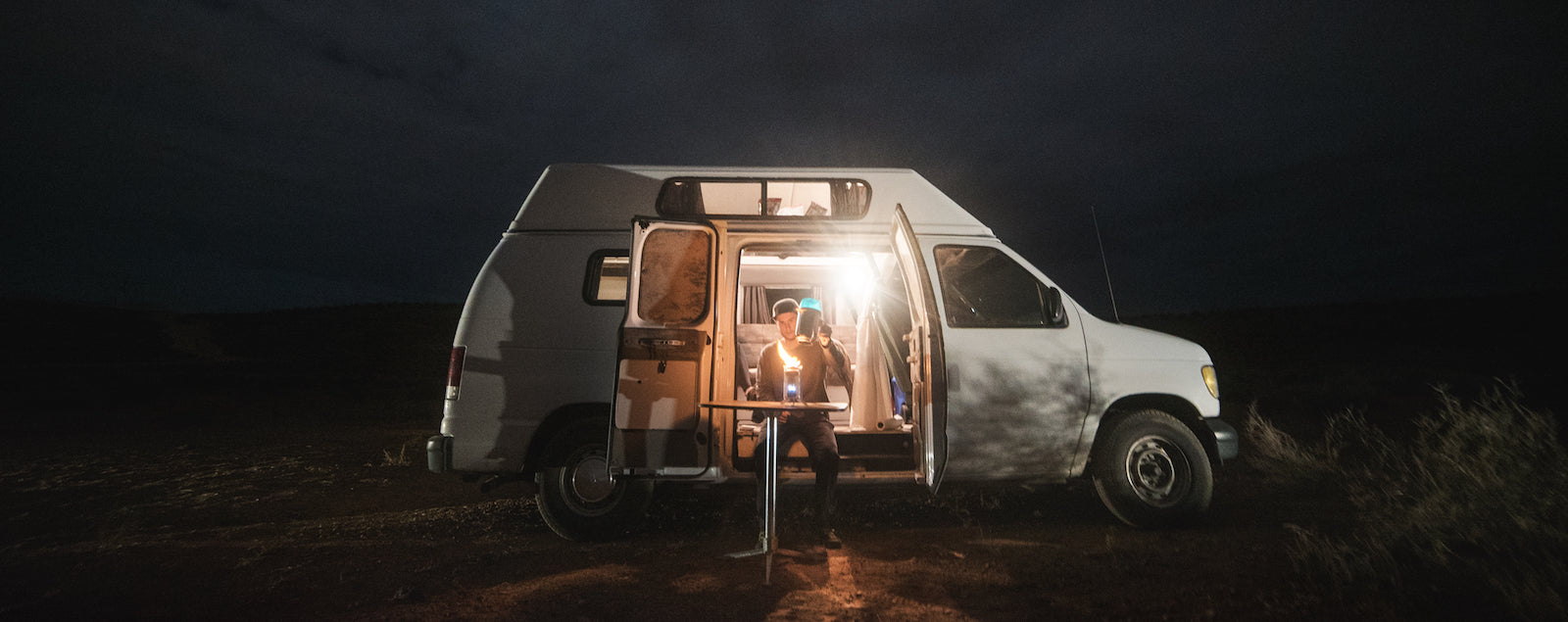
Hitting the road as a van-lifer sounds like an ideal situation for those hungry for more adventure. Flexible hours, working from wherever you choose, and embracing minimalism - it’s all pretty enticing. And these days we are seeing more and more people balance living nomadically while holding down a job.
The New Year is a time when many of us reflect on work/life and the possibilities ahead; for those who might be considering van life or a more mobile lifestyle this year, we’ve rounded up actionable tips from three digital nomads. They’re living life on the road and off the grid and have some honest advice on the reality of the daily hustle.
Brian - The Off-Grid Aficionado
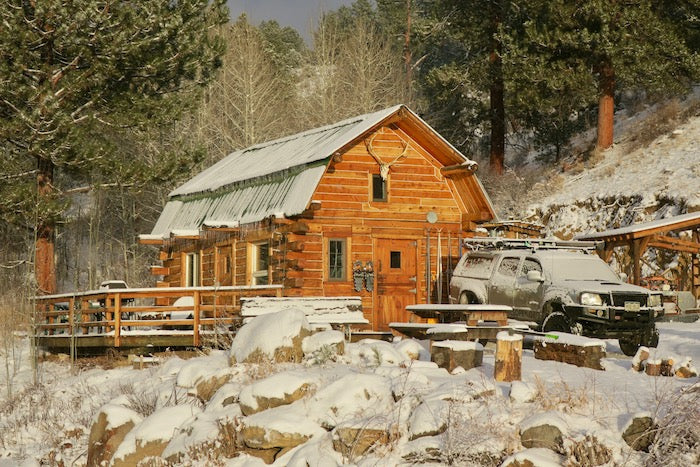
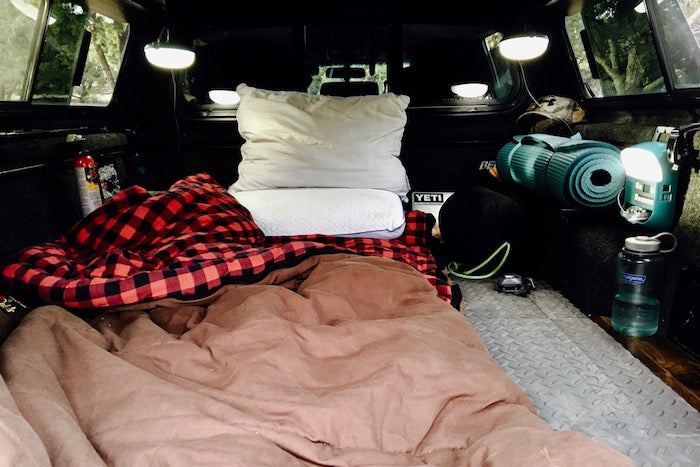
"In the Spring of 2015, I decided it was time for me to start living my life the way I wanted to, not how society defined it for me,” says Brian, a nomad who splits his time between a built out Tacoma 4x4 and off-grid campsites year-round. “I cut the tether to a physical address on July 5th, 2015 - it’s been a life changing experience!"
Brian's Ride
"I have a 2005 Toyota Tacoma 4x4 double cab short bed with a 4.0L V6 engine pushing out 245 horsepower," say Brian. "My custom upgrades include: ARB Old Man Emu 3 inch suspension lift with upgraded heavy duty leaf springs, 17 inch Pro-Comp wheels and 34 inch Toyo Open Country All Terrain Tires, A.R.E. Insulated Topper with a Yakima Roof Rack, a 5 Gallon Solar Shower, BioLite SolarHome 620, Custom DIY insulated topper slide out extension (this expands the length of my sleeping area from 5 feet to 6 feet 10 inches), weBoost cell phone booster, ARB Deluxe Front Bumper."
Job(s)
- Ranch Hand - focusing on water irrigation, forest health, and trail work.
- Podcast Host - Nomad Ramblings: Conversations from the Road.
- Brand Ambassador & Collaborator.
Brian's Tips for Becoming a Digital Nomad:
- Test it out before you jump in. Push yourself to stay out for long periods of time to gain perspective on what it’s like to be off-grid on a part-time or full-time basis. A test drive helps you work through any challenges you may encounter and develop troubleshooting techniques for the real deal.
- Embrace a minimalist mindset - both mentally and physically. A common theme among digital nomads is to live simply which is accomplished by focusing your attention, finances, and time on important matters only. Practicing to live this way eliminates distractions and helps one to focus on matters at hand.
- Internet connectivity is the most important component for success in my work. Many times I’ll be in a location far from a dedicated internet connection so having a cellphone with unlimited data is essential for content creation, website development, and keeping up with emails. Many cell phone carriers now offer unlimited data specifically for your phone and an additional 10GB dedicated to wireless hotspot usage. You’ll be happy with the flexibility to work anywhere there's a cell phone signal as this will reduce unneeded trips to town.
- Build out your go-to work kit. My general rule of thumb for living as a digital nomad is to have a dual purpose for each piece of gear. A few things I couldn’t work without are a cell phone booster, Smartphone, GPS with two-way texting capabilities, solar power, generator, battery storage, and ample lighting.
Biggest Challenges:
- Life as a digital nomad is unpredictable. Everyday tasks take much longer - hand-washing your clothes, harvesting energy, preparing meals, heating/cooling your structure, personal hygiene, etc. Be flexible and expect your schedule to change.
- Weather plays a big part of your day, plan accordingly. For example, if you have four consecutive days of cloudy weather in the forecast, you will need to be mindful of your energy consumption especially if you're relying on solar.
All this being said, the advantages of this lifestyle are bountiful: reduced stress, abundance of time for creative endeavors, and it’s low-cost (my entire monthly budget is $1500).
Reality Check About the Hustle
"Building an audience while staying authentic can be challenging. It’s important to only work with brands or organizations who share your vision. It’s tempting to accept the first opportunity to come along but my advice is to objectively assess each endeavor to make sure it will compliment your brand."
Laura - The Content Creator
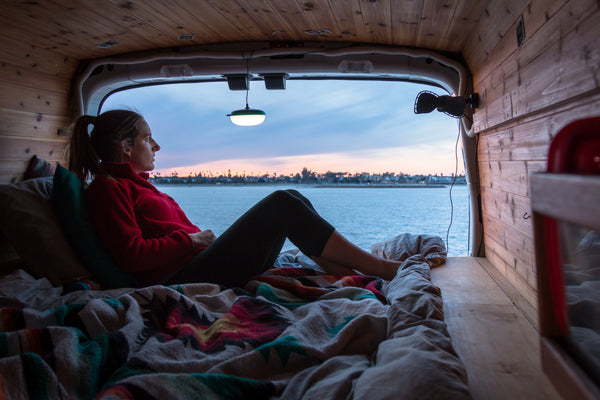
Laura’s been working remotely on the road for the past two years, “I was excited about the potential of taking on new professional creative challenges. Photography and writing have always been a big draw for me, and the outdoors a huge inspiration for my work. When I thought about being able to go outdoors, take photos, and then come back to my van and edit or write, still surrounded by the same environment I had just been shooting in...well, it was a major motivator for me to make the move.”
Laura's Ride
"When I purchased my 2013 Ford Transit Connect it was a basic cargo vehicle and had nothing inside of it. I added in everything I'd need to make it a part-time rolling home and mobile podcast studio. For me, this meant working with my friend Laura Patton of @mobileroamers to build out: a small kitchen counter that doubles as a workspace, a bench and bed system, a simple electrical system (I have a 200 amp hour battery connected to the van's alternator, so it charges when I drive), pine planks and blackboard paint on the walls, and porthole windows on the back doors - for fun and for a little extra natural light."
Job(s)
- Host & co-producer of the Women On The Road podcast in partnership with Gale Straub of She Explores.
- Photographer for women's retreats, adventure touring companies, outdoor product brands, and small business owners.
Laura's Tips for Becoming a Digital Nomad:
- Proper scheduling is key. Between traveling through time zones, coordinating remotely with business partners and clients, and wanting to create time to experience the joys of your journey, balance isn't going to happen organically - you have to intentionally create it.
- Understand your power needs. It's no fun to have to sit in a cafe down the road from the amazing free campsite you were just staying at simply because your devices need a charge. I highly recommend having a battery bank that can charge any of your devices and is both solar and outlet-rechargeable. I also recommend having multiple versions of chargers for each device so that if you aren't going to be near a wall outlet for a while, you can use your car's cigarette lighter to charge your computer, for instance, while you're driving. An inverter that plugs into your car's outlet is a fine solution as well.
- Plan work time to be closer to town and then go enjoy camping when you don't have to have service. After working from the road for nearly two years, I prefer to spend more time on the backroads when I don't desperately need to be taking calls or doing anything major when it comes to the internet. It's a great creative recharge time for me and in fact eliminates distractions while I create podcast episodes, edit photos, or write. In my experience, even with the proper equipment like a signal booster, service out in the open wilderness can be hit and miss. That said, if you truly want to have it all, you definitely can with some searching around. I find Google's internet speed test to be extremely helpful in identifying whether I'll be able to have enough service to complete my work or not.
Biggest Challenges:
- Navigating the process of building out a camper van for the first time. Initially, I traveled out on the road with an ex-boyfriend, and the van we toured the Western US in we built together. As first-timers to van conversions, and both being employed in offices full-time, it took us 2.5 years to complete the build. I recently converted another van myself, with the help of an awesome friend, and it only took a couple weeks for this iteration. So, while a van build *can* take a lot of your time and resources, it certainly doesn't have to.
- Nobody goes about this the exact same way because everyone's work needs are different. Research is helpful, but you'll also get a ton of conflicting information because there's no one right answer (which is beautiful as much as it can be confusing!). Assessing what your needs are, and trying different things out to learn about your preferences are really the best two ways to know what your ideal set up is going to look like. We dive into a lot of these topics on Women On The Road. Tune in weekly to pick up practical tips as well as honest stories from a wide variety of female travelers.
Reality Check About the Hustle
"When it comes to hustling, it really is as ongoing and challenging as it sounds," says Laura. "Building a body of work you're confident in charging for (as well as known for) takes time, persistence, and self-acceptance. Being self-employed is a rollercoaster and there's not a day you can really phone it in because your livelihood depends on your showing up daily. Doing what you love and creating the schedule you want is the best way to make sure you feel like the hustle is worth it."
Laysea - The Traveller & Freelancer
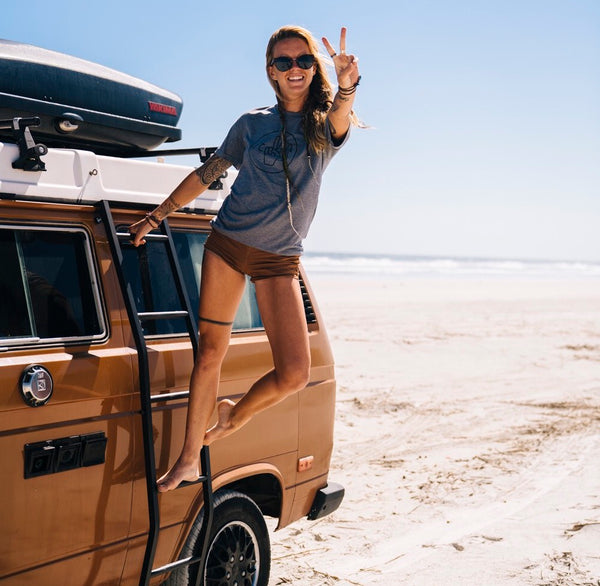
“When I first fell in love with traveling it consumed my life,” says Laysea who's been traveling in her van for the past four years. “My desire to see and experience more became everything and I found a lifestyle that supported that, which was a full time traveling position."
Laysea's Ride
"I have a 1983 VW Westfalia," says Laysea. "Westy’s by nature are designed to be a camper, fitted with double burner stove, sink, fridge, pop up top with additional bed. I have since put in a brand newly rebuilt motor to go a bit faster and run a bit smoother. I have designed veggie holders out of macrame, like your classic hippie van. One thing I always keep on hand is a squeegee! When you wake up in the morning and there is condensation on the front windshield, a squeegee is magic."
Job(s)
"I plan out my travels and if I find a town I want to spend more time in I pick up a job, typically one that will immerse me in the community. I've been a nanny, professional kayak guide, yoga teacher, coffee barista, freelance writer, marijuana cultivator, and more."
Laysea's Tips For Becoming a Digital Nomad:
- Give yourself time to adjust. When making the shift to a nomadic lifestyle, whether it is a shift from a stationary digital worker, or from a conventional job, give yourself time. Big shifts aren't easy and won’t happen overnight. When I was transitioning to freelance artist I continued with small side jobs to supplement income, as to not put too much pressure on creating this new job.
- Start out with a bit of savings for a cushion. The benefit of living in a van is that the expenses are minimal. So the immediate demand for a high paying gig is small. I love living a minimalist life, but the benefits of being a Digital Nomad are anything but minimal.
- Find a work space that works for you. Going to new coffee shops on the road is a great way to meet people in the area and learn about community events. Libraries are also a great work place. We have also created a work table in our van, and have a remote hotspot on our phones (free with a Verizon plan) so we can work from anywhere we have service. I love to set up the space with incense, and make a fun beverage to make work feel pleasant. Maca coffee and bubbly herbal beverages are my favorite.
Biggest Challenge:
- Exploration vs. Meeting Deadlines. Shifting a passion into a paying job takes dedication. Balancing waking up in a new place, eager to explore and having a deadline to meet can be hard. My solution is half days. I work, even if for just a little, every day.
Reality Check About the Hustle
"Some days while staring at my computer screen incessantly scrolling, googling, searching brands and job potentials, I feel like ‘the struggle is real’. Then on days my office is beach front or mountain valleys, and I am barely trying while getting emails and client connections I feel like screaming from the (van) roof ‘the hustle is real’!
The reality of freelance is that I am my own boss; being my own boss effectively means the only person I have to get upset with, or be grateful for, is myself. So if a project falls through I have no one to blame but myself. With that being said, everything that does work out, every piece I have published, or every print I have sold is all because of me! My hard work, my energy, my talent; and that is an amazing feeling."
If you can make a nomadic lifestyle work for you - it is an awesome way to travel, connect with new communities, reduce your footprint, and minimize overall costs of living.
After reading through the tips above, do you find yourself still interested in becoming a digital nomad but aren’t quite sure? We recommend taking vanlife for a test drive.
Take a look at our latest guide from a few ambassadors who travelled around New Zealand in a van to learn about the lifestyle before they jumped in completely.
Still have questions? Comment on our latest Instagram post tagging Brian (@coloradobackcountryadventures), Laura (@howsheviewsit), or Laysea (@gypsealaysea).



